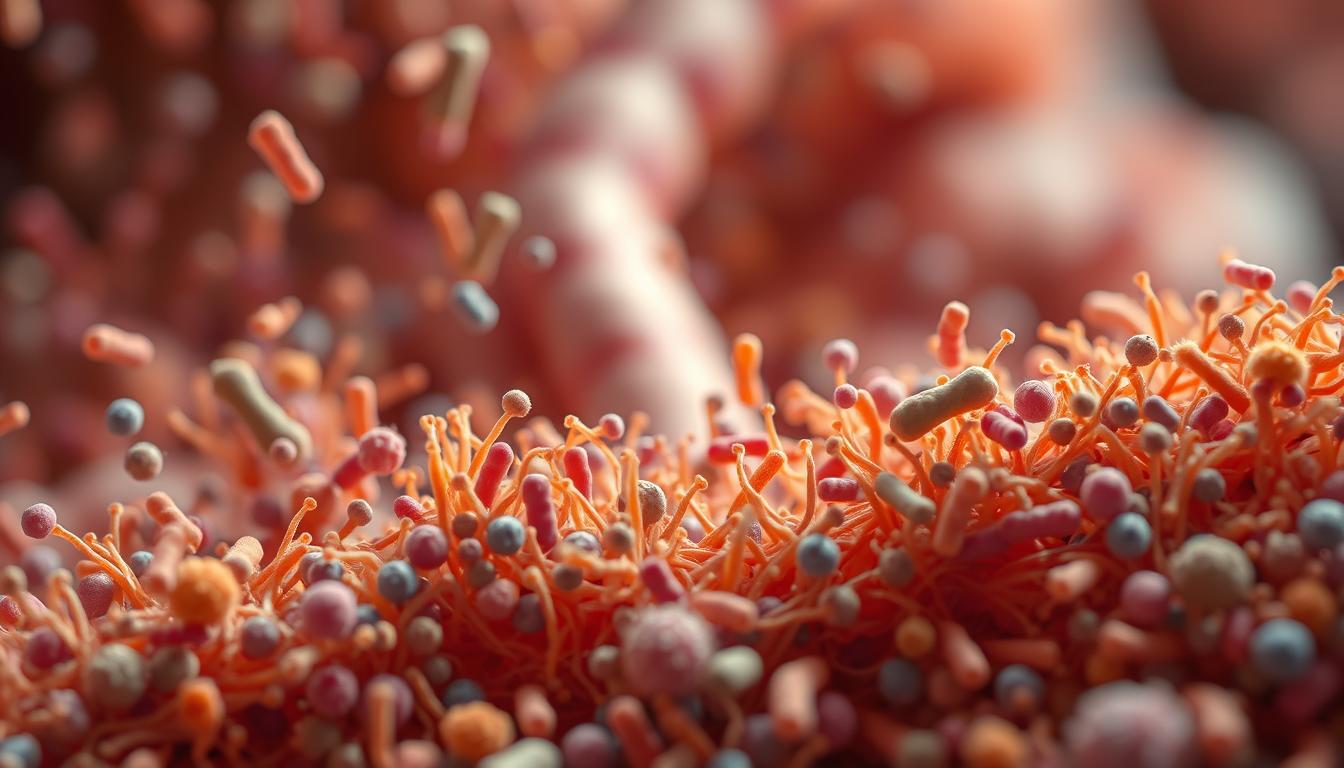Optimize Your Gut Microbiome for Better Health
A healthy balance of good bacteria is key for feeling well. Having many types of “good”…

A healthy balance of good bacteria is key for feeling well. Having many types of “good” bacteria is important for a healthy gut. Studies show that an unbalanced gut can cause health problems.
It’s important to keep your gut health in check for better health. A healthy gut helps with digestion, metabolism, and even your mood. By making a few easy changes, you can help your gut stay balanced and feel better.
Key Takeaways
- A diverse range of beneficial bacteria is key for health.
- An unbalanced gut can cause health issues.
- Keeping your gut healthy is important for well-being.
- A healthy gut helps with digestion, metabolism, and mood.
- Simple changes can help keep your gut balanced.
Understanding the Gut Microbiome
The trillions of tiny living things in your belly are called the gut microbiome. They are special to you and help keep you healthy.
What is the Gut Microbiome?
Your gut microbiome has many tiny creatures like bacteria and fungi. They work together to keep your body running smoothly. A healthy gut microbiome helps with digestion, keeps your immune system strong, and makes vitamins.
Many things can change your gut microbiome, like what you eat and how you live. Knowing about your gut microbiome helps you stay healthy.
Importance of Gut Health
Keeping your gut healthy is key to feeling good. A balanced gut helps your immune system and digestion. It also makes vitamins.
Research shows that your gut health affects your mood and how you metabolize food. Eating foods that help your gut, like probiotics and fermented foods, is important.
How the Microbiome Affects Your Body
Your gut microbiome affects many things in your body, like digestion and mood. If it’s out of balance, you might feel sick or have mood swings.
Knowing how your gut microbiome works helps you keep it balanced. Eat well, manage stress, and avoid too many antibiotics.
Factors Influencing Your Gut Microbiome
Your gut microbiome is shaped by many things. Your diet, lifestyle, and the environment all play a part. These factors help keep your gut healthy.
Diet and Nutrition
Eating foods high in fiber and polyphenols helps your gut. Fruits, veggies, and whole grains are great. They give your gut the nutrients it needs.
Adding probiotic-rich foods like yogurt and kefir is good too. They help your gut have more kinds of good bacteria.
Eating a variety of plants is good for your gut. They give your gut lots of nutrients and fiber. This helps the good bacteria grow. Don’t forget to eat prebiotic foods like asparagus and bananas. They feed the good bacteria, keeping your gut balanced.

Lifestyle Choices
How you live affects your gut health a lot. Exercise helps your gut move and grow good bacteria. Getting enough sleep is key too. It keeps your immune system strong and your gut balanced.
Managing stress is important for your gut. Stress can upset your gut’s balance. Try meditation and deep breathing to help.
Environmental Factors
Environmental toxins can harm your gut. Try to avoid pesticides and chemicals. Choose organic food when you can. And stay away from foods with lots of additives.
- Choose organic produce to reduce exposure to pesticides.
- Avoid heavily processed foods that contain artificial additives.
- Use filtered water to reduce exposure to environmental toxins.
By paying attention to these factors, you can keep your gut healthy. Making smart choices is key.
Foods that Support a Healthy Microbiome
The foods you eat shape your gut microbiome. Eating the right foods helps grow good bacteria. This boosts your gut health.
Probiotic-Rich Foods
Probiotics are good bacteria and yeasts for your gut. Eating foods rich in probiotics helps your gut. Yogurt and kefir are great sources. They have many good bacteria.
Sauerkraut and miso are also good. They help your gut and taste great.

Prebiotic Foods to Include
Prebiotics are fibers that feed good bacteria in your gut. Eating foods rich in prebiotics helps these bacteria grow. Bananas, onions, and garlic are full of prebiotics.
Adding these to your meals is easy and tasty. It helps your gut microbiome stay healthy.
Fermented Foods for Gut Health
Fermented foods are key for a healthy gut. The fermentation process creates good compounds. Kimchi, pickles, and kombucha are full of probiotics.
They add variety to your diet and help your gut. By choosing these foods, you can improve your gut health and overall well-being.
“The gut is the gateway to understanding the full potential of the human body.”
The Role of Fiber in Gut Health
Fiber is key for a healthy gut. It feeds good bacteria, helping your gut work right. Eating the right fiber helps grow good bacteria, making your gut healthy.

Types of Dietary Fiber
Dietary fiber is two types: soluble and insoluble. Soluble fiber is in oats, barley, and fruits. It turns into a gel, helping good bacteria grow.
Insoluble fiber is in whole grains, veggies, and nuts. It makes stool bulkier and helps you go regularly. Both types keep your gut healthy.
How Fiber Benefits the Gut
Fiber feeds good bacteria, making your gut strong. This balance is vital for a healthy immune system and digestion. It even helps your mind.
“A high-fiber diet is associated with a lower risk of chronic diseases, including heart disease, diabetes, and certain cancers.”
Fiber also helps control blood sugar and makes you feel full. This can help with weight. Fiber’s benefits go beyond just gut health.
Recommended Daily Fiber Intake
The daily fiber goal is 25-30 grams, based on age and gender. But many eat less than 15 grams.
Eat more whole foods like veggies, fruits, whole grains, and legumes. This helps you get enough fiber. It supports a healthy gut.
Dr. Joel Fuhrman said, eating a diet rich in fiber is one of the most important things you can do to promote your health.
This shows how important good food choices are for your gut and health.
The Impact of Antibiotics on Gut Health
Antibiotics can be good and bad for your gut. They fight infections but can also harm your gut health. This is because they affect the good bacteria in your gut.
Antibiotics kill bad bacteria but also harm good bacteria. This can cause digestive problems and weaken your immune system.
Disrupting the Microbiome
Antibiotics upset the balance of your gut’s bacteria. They kill both good and bad bacteria. This can cause:
- Reduced diversity of gut bacteria, making your microbiome less resilient.
- Overgrowth of harmful bacteria, potentially causing infections or other issues.
- Impaired digestive function, leading to symptoms like diarrhea or constipation.

Restoring Gut Balance
After using antibiotics, it’s key to get your gut balance back. Here’s how:
- Probiotics: Probiotic supplements or foods like yogurt can add good bacteria.
- Prebiotics: Foods like asparagus and bananas feed good bacteria, helping them grow.
- Dietary changes: Eating a variety of fruits, vegetables, and whole grains helps your gut.
Alternatives to Antibiotics
In some cases, you might not need antibiotics. Here are some options:
- Natural remedies: Some natural things can fight infections.
- Lifestyle changes: Better diet, exercise, and stress management boost your immune system.
Knowing how antibiotics affect your gut and taking steps to balance it can keep your gut healthy. This is good for your overall health.
Gut Microbiome and Mental Health
The gut-brain axis is a network that links your gut and brain. It’s key for your mental health and life quality. The gut microbiome plays a big role in this connection.
The Gut-Brain Connection
The gut and brain talk to each other through the vagus nerve. This lets them share signals that affect mood and thinking. An imbalance in the gut microbiome can cause anxiety and depression.
How Gut Health Influences Mood
Your gut health affects your mood. The gut microbiome makes important chemicals like serotonin and dopamine. These help control mood. An imbalance can cause mood problems.
The gut also affects how you handle stress. An unhealthy gut can make stress and anxiety worse.
Strategies for Reducing Anxiety
To lower anxiety, try different things like changing your diet and lifestyle. Eating probiotic-rich foods and prebiotic foods helps your gut. Also, meditation, yoga, and deep breathing can help calm you down.
Understanding the gut-brain link and caring for your gut can boost your mental health. It’s about living a balanced life that supports both your gut and mind.
The Effects of Stress on Gut Microbiome
Stress can change your gut microbiome, leading to digestive problems. When stressed, your body’s “fight or flight” response is triggered. This releases hormones like cortisol, affecting your gut.
Mechanisms of Stress Impacting Gut Health
Stress affects gut health in many ways. It can change how your gut moves, secretes, and gets blood. It also changes the types of bacteria in your gut.
The gut-brain axis is key in this. It’s a network that lets your brain and gut talk to each other. Stress can upset this balance, causing gut problems.
Stress-Relief Techniques
Managing stress is important for a healthy gut. Meditation, yoga, and deep breathing can help. Exercise also reduces stress and helps your gut move better.
- Meditation and mindfulness practices
- Yoga and tai chi
- Deep breathing exercises
- Regular physical activity
Creating a Balanced Lifestyle
Living a balanced life helps your gut. Eat well, sleep enough, and drink water. Managing stress and living healthy supports your gut and overall health.
Pay attention to how stress affects you. If gut issues last, see a doctor. Taking care of your gut and managing stress improves your life.
Evaluating Your Gut Health
Knowing your gut health is key for feeling good. Your gut microbiome affects digestion and even your mood.
Signs of an Imbalanced Microbiome
An unbalanced gut can show in many ways. Look out for:
- Digestive issues like bloating and pain
- Fatigue and feeling tired
- Skin problems like acne and rashes
- Mood swings and feeling sad
When to Seek Professional Help
If symptoms don’t go away, see a doctor. They can figure out if it’s your gut or something else. For more on gut tests, check this link.
Tests for Gut Health Assessment
There are tests to check your gut health:
- Gut Microbiome Testing: Looks at your gut’s bacteria balance.
- Stool Tests: Finds pathogens and inflammation.
- Blood Tests: Shows inflammation or gut health issues.
These tests can give you insights and help with treatment.
Supplements for Gut Health
Good supplements can help your gut stay healthy. A healthy gut is key for feeling good. Supplements can help keep your gut in balance.
Benefits of Probiotic Supplements
Probiotic supplements add good bacteria to your gut. This can help with IBS, boost your immune system, and even help your mind. They are great for people who have taken antibiotics.
Choose probiotics that science backs. Look for strains that are good for your gut. For more info, check out Cleveland Clinic’s probiotics page.
Which Supplements to Consider
Other supplements can also help your gut. Prebiotics feed the good bacteria in your gut. You might also want digestive enzymes to digest food better.
Always talk to a doctor before taking any supplement. They can help you choose the right one for you.
Potential Risks and Side Effects
Supplements can be good, but they can also cause problems. Some people might feel bloated, gassy, or uncomfortable. Start with a small dose and watch how you feel.
To avoid risks, pick high-quality supplements. Follow the dosage instructions. If you have bad side effects, stop and talk to a doctor.
Future Research on the Gut Microbiome
Research on the gut microbiome is growing. New findings are showing how your gut health affects your overall well-being. This research is leading to new ways to improve health and nutrition.
New Frontiers in Gut Health
Now, scientists are looking into personalized nutrition. They want to match diets to your unique gut microbiome. This could help keep your gut healthy.
Advances in Microbiome Science
New science is also helping find new treatments. Researchers are studying how the gut microbiome affects diseases. This could lead to new ways to prevent and treat illnesses.
As we learn more about the gut microbiome, expect new ways to keep it healthy. This includes personalized nutrition and advanced science.
FAQ
What is the gut microbiome, and why is it important for overall health?
The gut microbiome is full of tiny living things in your stomach. It helps with digestion and keeps your immune system strong. It also makes some vitamins. A healthy gut is key to staying well and avoiding sickness.
How can I support a healthy gut microbiome through diet?
Eating foods rich in probiotics, like yogurt, helps your gut. These foods have good bacteria. Also, eat foods high in fiber, like bananas, to help these bacteria grow.
What is the role of fiber in maintaining a healthy gut microbiome?
Fiber is important for your gut health. It feeds the good bacteria, helping them grow. It also helps you go to the bathroom regularly. Soluble fiber, like oats, feeds bacteria. Insoluble fiber, like whole grains, helps with bowel movements.
How do antibiotics impact the gut microbiome, and what can I do to restore balance?
Antibiotics can upset the balance of good and bad bacteria in your gut. To fix this, take probiotics and eat foods that help them grow. A healthy diet and lifestyle also help your gut recover.
Is there a connection between the gut microbiome and mental health?
Yes, an unbalanced gut can lead to anxiety and depression. The gut and brain talk to each other. Eating right and living well can help your mental health.
How does stress impact the gut microbiome, and what stress-relief techniques can help?
Stress can mess with your gut’s balance, causing problems. Techniques like meditation and yoga can help. They reduce stress and protect your gut.
What are the signs of an imbalanced gut microbiome, and when should I seek professional help?
Signs include bloating, pain, and other health issues. If symptoms last or are bad, see a doctor or dietitian.
Can supplements support gut health, and which ones should I consider?
Probiotic supplements can help your gut. Choose a good one backed by science. Talk to a doctor or dietitian to find the right one for you.
What are the emerging trends in gut health studies, and how may they impact our understanding of gut health?
New studies focus on personalized nutrition and microbiome science. These could lead to better ways to keep your gut healthy and prevent sickness.
